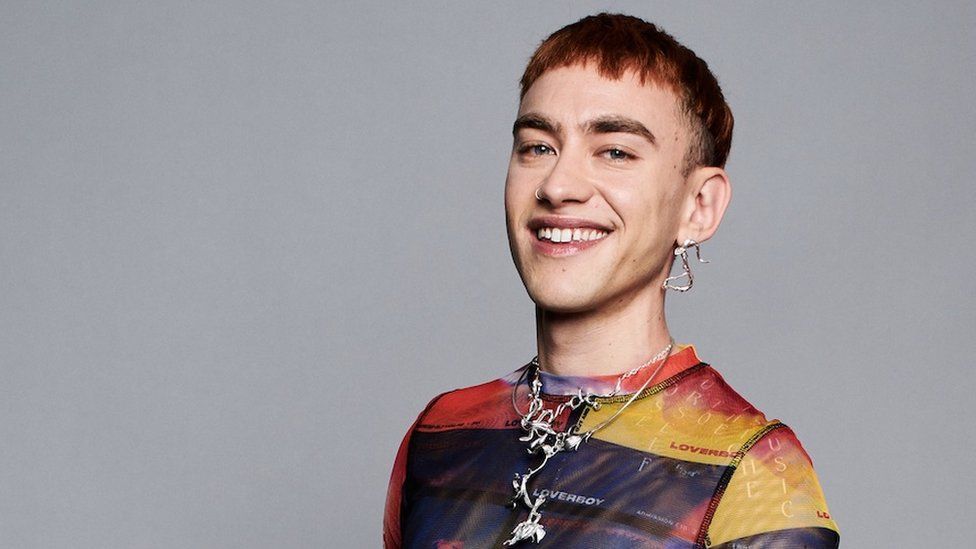
Olly Alexander was formerly the frontman of chart-topping pop band Years & Years
By Mark Savage
Music correspondent, BBC News
For decades, Eurovision fans have wondered why the UK underplays its hand so badly.
We produce world-beating pop stars like Ed Sheeran and Dua Lipa – but our Eurovision entrants have largely been untested amateurs, singing songs so underwhelming they might has well have walked on stage with a white flag.
The tide turned in 2022, when Sam Ryder brought the Bowie-inspired Space Man to Turin, blowing away cobwebs (and more than a few loudspeakers) with the Taurean force of his live vocals.
He duly claimed second place – the UK’s best result since 1998.
Buoyed by that success, the UK sent rising pop star Mae Muller to last year’s contest.
Her song, the archly titled I Wrote A Song, was a bubbly pop anthem that won approval from fans – but lacklustre staging and a problematic vocal performance torpedoed her chances.
The UK ended the night in 25th place, out of 26.
So what next? The BBC could have admitted defeat and returned to the ranks of reality show runners-up, or they could have doubled down.
Enter Olly Alexander – the former frontman of chart-topping pop group Years & Years, and a Bafta-nominated actor, who’s been obsessed with Eurovision his whole life.
“It goes right back to being a kid and watching the show with my family – ordering pizza and spending all night in front of the TV watching this insane, amazing show,” he told BBC News last year.
“It’s a bit like a spiritual homecoming for me because I love Eurovision so much.”
His participation was revealed on the grand final of Strictly Come Dancing last December – another sign of how seriously the BBC is taking the contest this year.
Three months later, he’s finally revealed the song he’ll be performing. A pulsing electro anthem called Dizzy, it dropped on streaming services at midnight, ahead of its radio premiere on Zoe Ball’s Breakfast show on Friday morning.
“It’s funny, I’ve never had a song with this much anticipation,” he told Graham Norton, in an interview that will be screened on BBC One at 10:40pm on Friday.
So will it make you giddy with excitement, or simply leave you nauseous?
The first impressions are good. This is a sleek, streamlined slice of modern pop (imagine the Pet Shop Boys on a trip to the disco) anchored by a descending chord progression that’ll be instantly recognisable to anyone who’s heard Gloria Gaynor’s I Will Survive or Miley Cyrus’s Flowers.
Unlike those songs, which are all about emerging from a break-up, this is more about falling head-over-heels, whisk-me-off-my-feet-and-kiss-me-on-the-mouth in love.
“Won’t you take my hand and spin me / Round and round so the moment never ends.“
The verses, meanwhile, are (intentionally?) written in the mangled English that characterises Eurovision’s best songs. “Beautiful garden / Eternal flowers,” sings Alexander, apparently quoting directly from the Interflora website.
Image source, Getty Images
Alexander duetted with Elton John at the 2021 Brit Awards
Crucially, however, the hook is instantly memorable – a huge advantage in a competition where you only have one chance to make an impression.
If there’s a criticism, it’s that the song could go harder. Instead of building to a climax, that final chorus is too polite. Without wanting to trivialise things, the song is desperately in need of a donk.
But that can all be tweaked for the performance. There’s no rule that says the live version has to sound like the radio edit; and a few well-timed pyrotechnics could easily bring the house down (not literally, one hopes).
As always, the staging is crucial, and that’s one area where Alexander excels.
His 2021 Brits performance of It’s A Sin, striding across Sir Elton John’s piano, was one of the ceremony’s most memorable performances in years. A blissed-out, intricately-choreographed Glastonbury set the following year proved he has the ability to command a huge audience.
The other variable is his competition.
After Loreen’s victory for Sweden last year, several countries have entered up-tempo bops – from the techno bounce of Lithuania’s Silvester Belt to the percolating synthpop of Spain’s Nebulossa.
Others have drawn inspiration from 2023’s runner-up, Kaarija, with Ireland’s Bambi Thug and Croatia’s Baby Lasagna putting forward gloriously chaotic songs that test the very boundaries of pop music.
In other words, the UK needs to work hard to distinguish itself.
Personally, though, I can’t see Dizzy tripping up too badly. Alexander is a beloved performer with name recognition across Europe, and the song capitalises on his cheeky charisma.
It might not attract “douze points” across the board, but it would be hard to relegate to last place.
All eyes will be watching when Alexander twirls into Malmö this May.








